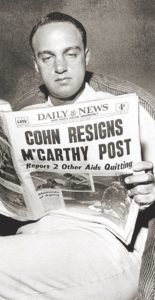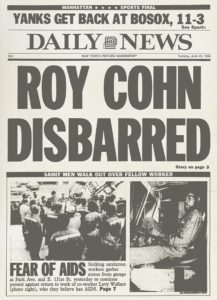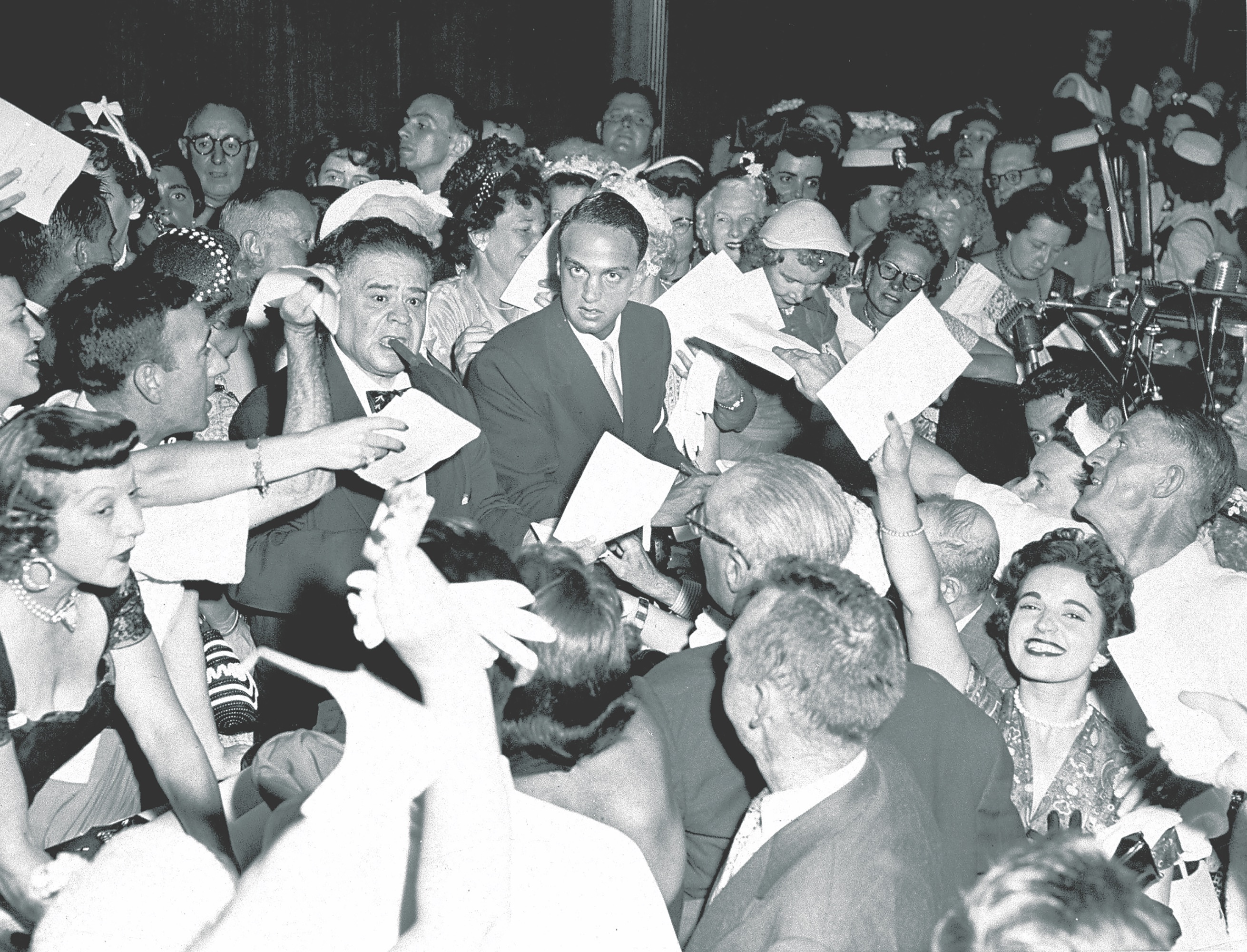Joe McCarthy’s sidekick and Donald Trump’s mentor was not a very nice man
For decades before he died of AIDS in 1986, Roy Cohn predicted that the first sentence of his obituaries would identify him as the lawyer for Senator Joseph McCarthy’s commie-hunting subcommittee. He was right. But Cohn worked for McCarthy less than two years. For 30 years more, he cultivated fame as a pit-bull lawyer, party animal, crooked businessman, tax cheat, and deadbeat. “Don’t Mess with Roy Cohn,” Esquire magazine warned in 1978. “He is a legal executioner—the toughest, meanest, vilest and one of the most brilliant lawyers in America. He is not a very nice man.”
Born in Manhattan in 1927, Roy was the only child of Albert Cohn, a fixer for Tammany Hall, which rewarded Cohn the elder with a judgeship. Watching Pop, his boy became a precocious hustler. In high school, Roy used his father’s clout to fix traffic tickets for teachers and to arrange Post Office jobs for people willing to pay him kickbacks. A brilliant lad, he earned both a bachelor’s degree and a law degree from Columbia University before reaching 21. In 1948, with daddy’s help, he became a federal prosecutor in Manhattan. He played a small role in the 1949 prosecution of Communist Party leaders for advocating the overthrow of the government. Two years later, his skillful courtroom interrogations helped convict Julius and Ethel Rosenberg of espionage.
The Rosenberg trial made Cohn famous enough to go clubbing with J. Edgar Hoover and columnist Walter Winchell. In 1953, McCarthy hired Cohn as his subcommittee’s chief counsel. Cohn named G. David Schine, handsome scion of a hotel baron, as his unpaid assistant. That spring Cohn and Schine flew to Europe on a highly publicized 17-day search for subversive books in U.S. Embassy libraries. When the pair returned, McCarthy held hearings on leftist writers during which Cohn browbeat black poet Langston Hughes about a Depression-era flirtation with communism.
That summer Cohn and Schine lived in adjoining rooms in a Washington hotel and frequently traveled to New York. “The two 25-year olds,” Time reported, were “cutting a wide swath through Manhattan’s best restaurants and nightclubs.” The fun ended that fall when Schine was drafted. Peeved, Cohn pressed the army to grant Private Schine extraordinary privileges, including runs to Manhattan by chauffeured limo to hang with Cohn. When the press exposed Schine’s perks, McCarthy accused the Army of holding Schine “hostage.” That dust-up figured in the legendary Army-McCarthy hearings. For 36 days in 1954, Americans watched McCarthy on live TV as he bullied witnesses and bellowed “Point of order!” Then viewers watched Joseph Welch, the Army’s patrician lawyer, skewer McCarthy with his now-famous question: “Have you no sense of decency, sir?”

Before the year was out the Senate voted to censure McCarthy. Cohn quit the committee and returned to New York. Wags mocked him as America’s youngest has-been, but Cohn had no intention of embracing obscurity or impecuniousness. Hired by a Manhattan law firm, he attracted an eclectic clientele—dozens of rich New Yorkers eager to shed unwanted spouses, Roman Catholic Cardinal Francis Spellman and the Archdiocese of New York, Mafia bosses Carmine Galante and Anthony “Fat Tony” Salerno, Yankees owner George Steinbrenner, and a young real estate tycoon named Trump. Clients engaged Cohn to get a ruthless hired gun, willing to do anything to win. “My tough front is my biggest asset,” he said. “I don’t write polite letters. I don’t like to plea bargain. I like to fight.”
He won many of those fights, but not all. In 1973, the federal government sued a real estate firm owned by Fred Trump and his son for bias against black people trying to rent apartments. The son asked Cohn’s advice. “Tell them to go to hell,” Cohn said, “and fight the thing in court.” Delighted, Donald Trump hired Cohn to do just that. He and Cohn held a press conference announcing a $100 million countersuit. That action generated headlines but was quickly dismissed. In 1975—after two years of legal battles and legal fees—Trump bowed to the government’s terms. Despite that costly failed stunt, Trump considered Cohn a savant.
Cohn dabbled at a miscellany of businesses—banks, insurance companies, parking lots, porn theatres. He financed his enterprises with other people’s money. “Lightfooting around the globe,” Time reported in 1960, “Cohn juggled loans from U.S. and foreign money lenders, borrowing from one to pay another.” Cohn loved obtaining things but hated paying for them. “What he does is simple,” one creditor told the Daily News. “He buys, he doesn’t pay. He makes you go to court and when you get a judgment, he wants to settle for 50 cents on the dollar.” Cohn’s finagling led to federal indictments for fraud, bribery, and conspiracy. Three times, the feds tried him. Three times, he won acquittals.
Dodging legal bullets emboldened him. He schemed to avoid paying taxes—and bragged to reporters about how: He took only a small salary from his law firm, which paid all his expenses, including lunches at Le Cirque and a chauffeured Rolls. His firm held the title to the Manhattan townhouse he occupied, and a corporation controlled by cronies owned his 97-foot yacht, Defiance. When the IRS came seeking millions in back taxes, the agency found Cohn owned no assets to seize.
Cohn parlayed utter shamelessness into a reputation as a colorful rogue. A world-class raconteur, he charmed famous friends—Norman Mailer, Barbara Walters, Estee Lauder, Ronald and Nancy Reagan. By the 1980s, he had become a regular at cocaine-fueled discotheque Studio 54 and in tabloid gossip columns that covered his birthday parties, at which judges and politicians hobnobbed with socialites and Mafiosi.
Gossipmongers knew but did not report that the closeted Cohn regularly hired male prostitutes for orgies aboard Defiance. Denying he was gay, Cohn denounced homosexuals and called gay teachers “a grave threat to our children.” And when in the mid-80s he contracted AIDS, he swore he had liver cancer.

In June 1986, as Cohn was battling AIDS, a five-judge panel disbarred him for stealing $100,000 from a client, among other “reprehensible” practices. Cohn proclaimed the judges “a bunch of yo-yos.” He died six weeks later.
In his epic Pulitzer Prize-winning play “Angels in America,” which debuted in 1991, dramatist Tony Kushner resurrected Cohn as his protagonist—portrayed over the years by Nathan Lane, Al Pacino, and F. Murray Abraham. A New York Times review of the 1993 Broadway production evoked the fictional Cohn with a phrase redolent of the real article: “…a demon of Shakespearean grandeur, an alternately hilarious and terrifying mixture of chutzpah and megalomania, misguided brilliance and relentless cunning.”
This American Schemers column appeared in the June 2020 issue of America History.





